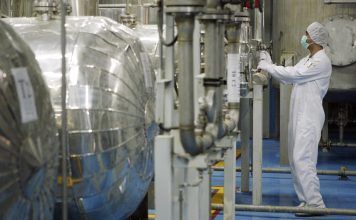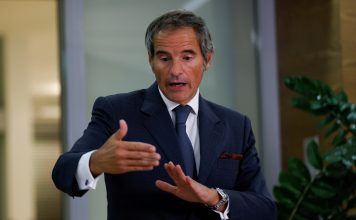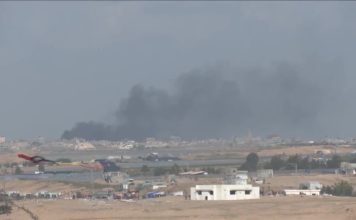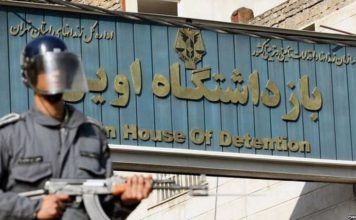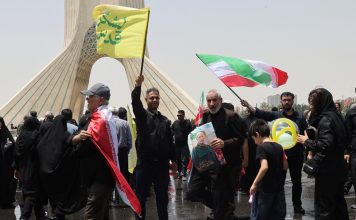Iran, China and Russia constitute an “axis of evil” which aims to destabilize global security, former US State Department official Ellie Cohanim said.
Cohanim made the comment during a May 11 online event held by the National Union for Democracy in Iran (NUFDI), a nonprofit organization based in Maryland.
“For Western secular policymakers sitting in Washington DC, it may be impossible for you to imagine that other people are motivated by religion. This is a problem that the West truly has, which is getting into the brain of the other and trying to understand how they think. It’s really important for us to understand the Iranian mentality,” Cohanim said. “We’re in a moment where the United States is being challenged by the Chinese Communist Party, and I would argue that there’s an axis of evil right now between China, Russia and Iran.”
Cohanim was the US deputy special envoy who monitored and combated anti-semitism at the US State Department during the presidency of Donald Trump, and the Department’s first Iranian-born Jewish representative. She fled Iran during the Islamic Revolution in 1979 with her family when the country became an Islamic republic.
[aesop_image img=”https://kayhanlife.com/wp-content/uploads/2021/07/ellie-cohanim.jpeg” panorama=”off” credit=”Ellie Cohanim./” align=”center” lightbox=”on” captionsrc=”custom” captionposition=”left” revealfx=”off” overlay_revealfx=”off”]
The phrase ‘axis of evil’ was coined by former US President George W. Bush during the State of the Union Address delivered to the US Congress in 2002, four months after the Sept. 11 terror attack. The attack — launched by terrorist group Al-Qaeda — destroyed the World Trade Center in New York City and killed 2,977 people. The term refers to states which the US believes pose the greatest threat to Western leadership, and world peace. Bush’s axis of evil at the time included Iran, Iraq, and North Korea.
The event, titled “Vienna Talks” saw panel members discuss the ailing 2015 Iran nuclear deal, and what new strategies could be implemented to revive the agreement. It was chaired by Eli Lake, a fellow at the University of Texas at Austin for National Security, and NUFDI’s policy director Cameron Khansarinia.
The conference consisted of two panels. The first panel included: Mohammad AlYahya, a visiting fellow at the Washington-based think tank Hudson Institute; Ilan Berman, the Vice President of the conservative-led American Foreign Policy Council (AFPC); AFPC fellow Victoria Coates; and NUFDI policy fellow Navid Mohebbi.
Sitting on the second panel were: Cohanim; Blaise Mistzal, the vice president for policy at Washington-based NGO the Jewish Institute for National Security of America (JINSA); Gabriel Noronha, former special advisor for Iran at the US State Department from 2019 to 2020; and Behnam Taleblu, a senior fellow at Washington-based think tank the Foundation for Defence of Democracies (FDD).
Opening the first session, Lake asked the panelists to consider whether the deal could be revived after a months-long deadlock which had stalled negotiations about the deal in Vienna.
Addressing the attendees, Berman said the deal in its current form was no longer workable.
“What you see is an agreement that has a series of material deficiencies. If anything resembling what has been negotiated in Vienna comes to pass we’re going to have significant national security concerns,” Berman said. “The geopolitical context is everything and it’s not talked about nearly enough, but the current negotiations are an enormous boon to Russia. Russia is a strategic partner of Iran.”
[aesop_image img=”https://kayhanlife.com/wp-content/uploads/2022/05/2022-04-29T000000Z_741401081_MT1NURPHO000877XJ8_RTRMADP_3_IRAN-QUDS-DAY-1-scaled.jpg” panorama=”off” credit=”During state sponsored gathering individuals burn an effigy of the U.S. President, Joe Biden, in downtown Tehran during a rally commemorating the International Quds Day, also known as the Jerusalem day, on April 29, 2022. REUTERS./ ” align=”center” lightbox=”on” captionsrc=”custom” captionposition=”left” revealfx=”off” overlay_revealfx=”off”]
Referring to the Taliban’s takeover of Afghanistan and the invasion of Ukraine by Russia, Coates said the geopolitical developments in the last 12 months were connected to Iran. She criticized US President Joe Biden’s decision to show political restraint when Russia’s President Vladimir Putin reasserted Russia’s right in March to use nuclear weapons in Ukraine. Coates said the decision would embolden Iran’s Supreme Leader Ayatollah Ali Khamenei, and send a message that if the Iranian regime produced nuclear weapons Washington would not counter the development.
Speaking during the second session, Mistzal suggested a new deal should include every issue concerning the US.
“[Former US] President [Barack] Obama famously said in one of his first speeches when he was elected President, ‘I pledge to use all elements of American power to prevent a nuclear Iran.’ I don’t think he necessarily did that, but that should be the template here,” Mistzal said. “That should include a willingness to negotiate if there is reason to. It should include, importantly for this regime, political pressure on Iran to improve on its human rights and democracy record.”
Taleblu said the nuclear deal needed to be re-framed to take into account malicious activity by states world-wide, such as cyber warfare, money laundering and illicit finance.
“I think it’s very important to look at Iran as a much broader problem, as part and parcel of this new dialogue, this new framework that’s existing, which is great power competition,” Taleblu added. “Many of these roads lead to Rome or many of these roads do lead to Tehran.”
Noronha noted that regardless of any deal in place, there was little likelihood of the regime collapsing.
“I would love to see nothing more than the Islamic Republic gone. I’m very wary that it’s not going to happen. And so I think the way we have to frame it, is it is something you can hope for but it’s not something that you should necessarily take as a given,” Noronha said.
Referring to ways in which the world could help Iranians inside the country, Noronha suggested states could provide and install water purification systems, send basic goods such as food and provide citizens with internet access.
“We should start thinking creatively in that way of how to work directly with people. Maybe that’s support for labor strikes, which is something we’ve talked about a lot. But understanding that what the regime elite wants is very different to what 78 million Iranians want, who are not in posh neighborhoods of Tehran,” Noronha added.


